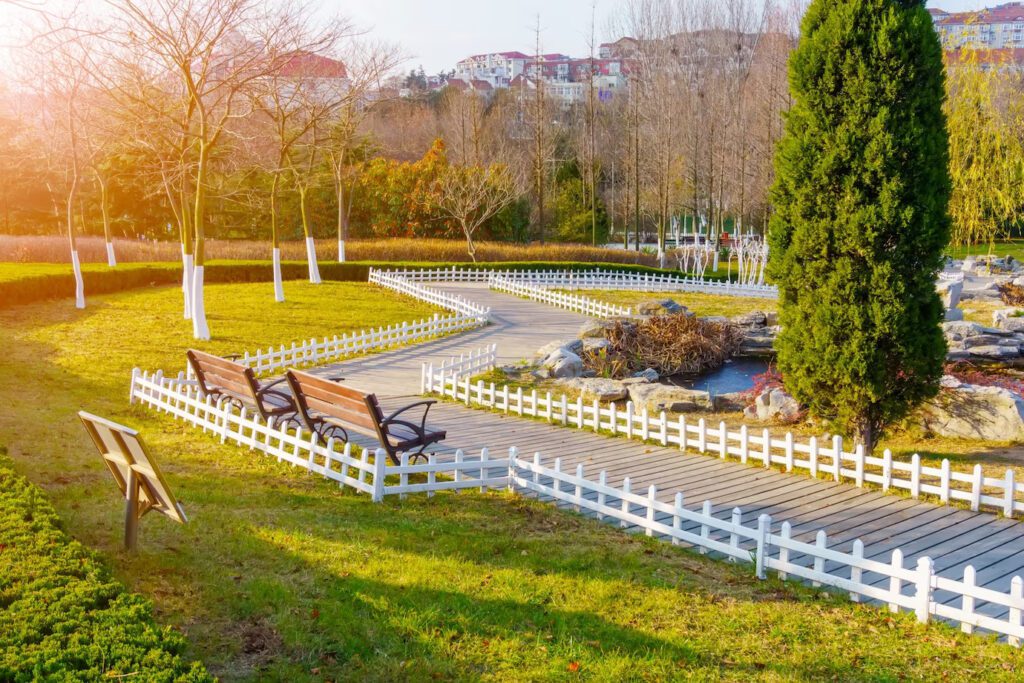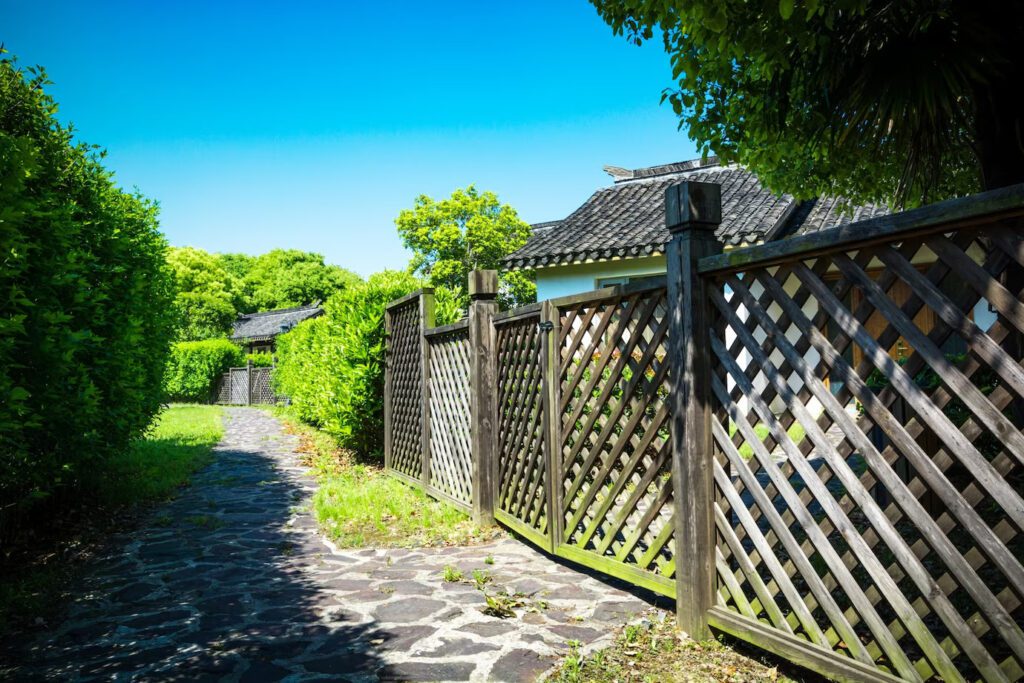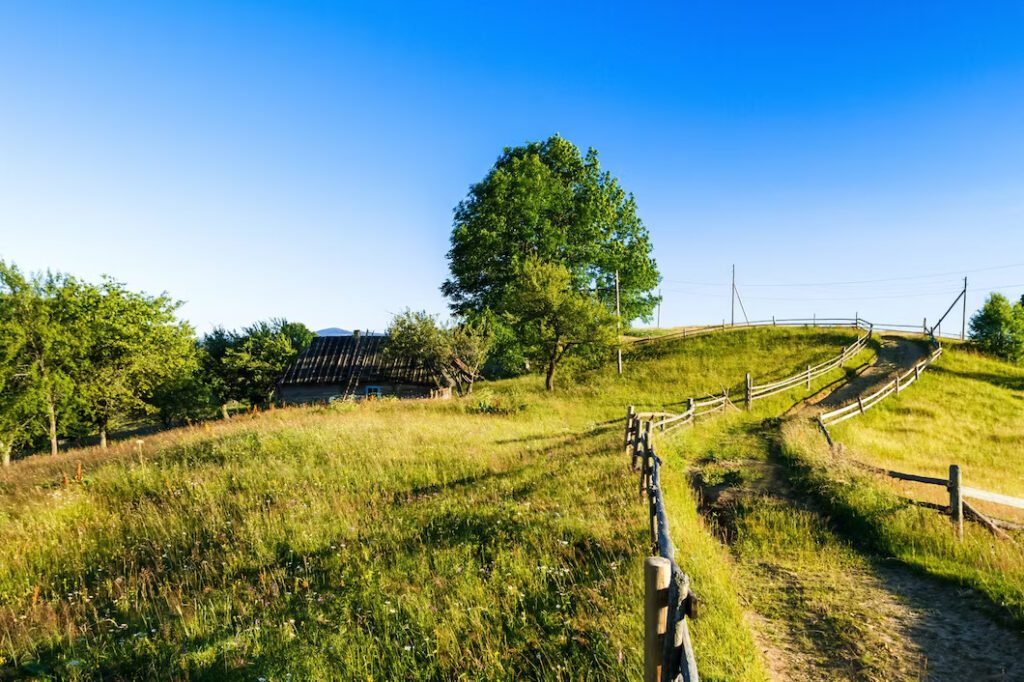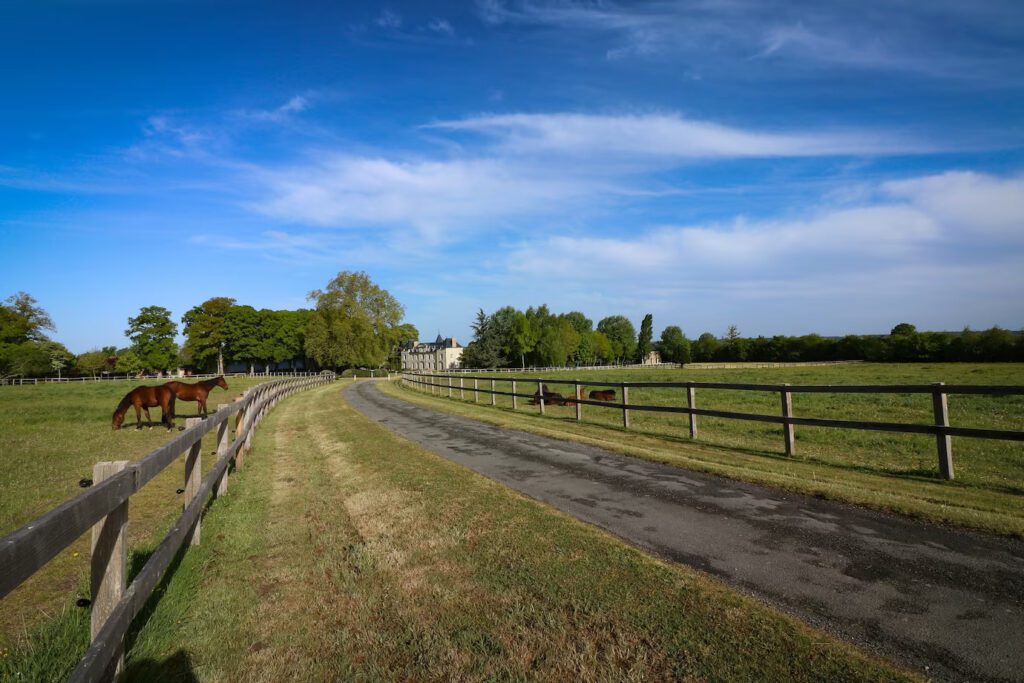- Free Estimates

Installing a wall or fence can be an ambitious endeavor — and for a good reason. Not only does it add beauty, structure, and privacy to your outdoor space, but it also increases the value of your home! If this sounds like something you want to take on yourself as a DIY project, you’re on the right page!
Whether it’s cedar picket fences or aluminum ornamental panels, our experienced fence installers in Newtown, CT, have put together a guide on how to install a fence for a smooth-sailing fence installation project.
Let’s check out what we have lined up for you!
Planning to install a fence is crucial to ensure a successful and long-lasting fence.
Here are essential factors to factors to consider when planning to install a fence in Newtown, CT:
Choosing the correct type of fence is an important decision that requires careful consideration. When selecting a fence, it’s important to consider the purpose of the fence, the level of maintenance needed, and the overall look you want to achieve.
Here are some common types of fences and their characteristics to help you make an informed decision:
Accurate measurements are critical to ensure you purchase the right fencing materials. Measure the perimeter of your property and add a few extra feet to account for corners and gates. You’ll also need to measure the height of your fence to determine the length of your fence posts.
Before you begin installing your fence, check with your local zoning regulations to ensure that your fence is compliant with any laws or regulations. It is especially important if you live in a homeowners association or a neighborhood with specific guidelines on fencing. Fence installers in Newtown, CT, will be familiar with local zoning laws and can advise you on any necessary permits or permissions.
Consider the purpose of your fence when deciding on the height and layout. For example, if you’re installing a fence for privacy, you’ll want a taller fence that blocks the view from the street or your neighbors’ yards. On the other hand, if you’re installing a fence for aesthetic purposes, you may want to consider a decorative fence with a unique layout.
A fence installer in Newtown, CT, can help you design your fence’s best layout and height based on your needs and budget. Once you have a clear plan, you can gather the tools and materials you’ll need for the installation process. A professional fence installer in Newtown, CT, can help you choose the right materials and provide guidance on how to install a fence.

Choosing the right materials is crucial for a successful fence installation. Factors to consider include the climate in Newtown, CT, your budget, and the maintenance required for each type of material. For example, wood fences are affordable but require regular maintenance, while vinyl fences are more expensive but require less maintenance and can withstand the harsh Newtown climate.
The next step in installing your fence is gathering the necessary tools and materials. Here’s what you’ll need:
Expert fence installers in Newtown, CT, can help you choose the best materials for your fence installation project and guide you through the process. They will have access to the necessary tools and materials and know how to use them efficiently and safely. In addition, working with a professional ensures your fence is installed correctly and will last many years.
Preparing your tools and materials is crucial to ensure a successful fence installation. Ensure your tools are clean and in good working condition and that you have all the necessary materials before you begin the installation process. A professional fence installer in Newtown, CT, can help you gather the necessary tools and materials to ensure everything is in good working order.
Preparing the site is the next step in installing your fence. Here’s what you need to do:
Use a string line to mark out the perimeter of your fence. It will ensure that your fence is installed in a straight line and follows the desired layout.
Remove any rocks, sticks, or other debris from where you’ll install the fence. It will ensure that your fence is level and secure and that no obstructions are in the way.
Use a post-hole digger to dig the holes for your fence posts. The holes should be deep enough to support the height of your fence and wide enough to accommodate the size of your fence posts. It’s important to ensure that the holes are dug evenly and aligned with the string lines.
Use string lines to mark the exact position of each fence post. It will ensure that your posts are evenly spaced and aligned, which is critical for your fence’s overall stability and appearance.
Fence installers in Newtown, CT, are experienced in preparing the site for fence installation and can ensure that your site is properly cleared, the fence line is correctly marked, and post holes are dug to the right depth and width. They can also help set up string lines to ensure that your fence posts are evenly spaced and aligned, giving you peace of mind that your fence will be installed properly.

Setting the fence posts in concrete is critical to installing your fence. Here’s how to do it:
Mix the concrete according to the manufacturer’s instructions. You can use a wheelbarrow or a mixing tray to mix the concrete. Fence installers in Newtown, CT, can help you combine the concrete to the right consistency and ensure it is properly prepared.
Position the posts in the holes you dug earlier. Use a level to ensure that the posts are straight and evenly spaced. A professional fence installer can help you correctly position the posts and ensure they are plumb.
Pour the concrete around the posts. Use a trowel to smooth the surface of the concrete and ensure that it is level with the ground. Fence installers in Newtown, CT, can help you ensure that the concrete is mixed and poured correctly and that the posts are securely set in place.
Use a level to ensure the posts are plumb (straight up and down). Adjust the posts as needed before the concrete dries. Fence installers in Newtown, CT, have the tools and expertise to ensure your fence posts are properly aligned and level.
Allow the concrete to dry completely before moving on to the next step. It can take up to 24 hours, depending on the weather conditions. Fence installers in Newtown, CT, will ensure the concrete can dry completely before moving on to the next step to ensure the posts are securely set in place.
Installing fence panels is the final step in installing your fence. After the concrete has dried, you can attach the fence panels to the posts and add any finishing touches.
Here’s how to do it:
Use nails or screws to attach the fence panels to the posts. Start at one end of the fence and work to the other. Ensure the panels are level and straight, using a level to ensure accuracy. Fence installers in Newtown, CT, can help you ensure the panels are installed correctly and securely.
If necessary, cut the panels to fit around any obstacles, such as trees or rocks. Use a saw to make the necessary cuts. A professional fence installer can help you make precise cuts and ensure the panels fit properly.
If you’re installing a gate, follow the manufacturer’s instructions to install the gate hardware. Use a level to ensure that the gate is straight and level. Fence installers in Newtown, CT, can help you install the gate correctly and ensure it opens and closes smoothly.
Once the fence panels are installed, you can add finishing touches, such as decorative post caps or trim. It will help give your fence a polished look and enhance its aesthetic appeal.
It’s important to ensure the fence panels are securely attached to the posts to ensure the stability and longevity of your fence. A professional fence installer in Newtown, CT, can help you ensure that the panels are attached correctly and that your fence is secure and stable.

Maintaining your fence is important to ensure its longevity and effectiveness in providing privacy, security, and aesthetic appeal to your property. Proper maintenance can also prevent costly repairs and replacements in the future. Here are some tips for maintaining your fence:
Regularly cleaning your fence can help prevent the buildup of dirt, debris, and other contaminants that can damage the material over time. Use a pressure washer or a garden hose with a spray nozzle to clean the fence. Be sure to follow the manufacturer’s instructions for cleaning your specific fence material, as different materials may require different cleaning methods.
Regularly inspect your fence for any signs of damage, such as loose or broken panels, posts, or hardware. It can help you catch any issues early on and prevent further damage.
If any fence sections become damaged, repair them immediately to prevent further damage. Use replacement panels or pickets to replace damaged sections. A professional fence installer in Newtown, CT, can help you make the necessary repairs and ensure your fence is secure and stable.
If you have a wood fence, it’s important to regularly stain or seal it to protect it from weather damage and rot. You should also trim any nearby trees or shrubs in contact with the fence, as this can contribute to rot and decay.
Vinyl fences are generally low maintenance, but you should clean them regularly to prevent dirt buildup. Avoid using abrasive cleaners or tools that can scratch the surface of the vinyl.
Aluminum fences are also generally low maintenance, but you should inspect them regularly for any signs of damage or loose hardware. You can also clean them with a garden hose or pressure washer to remove dirt and debris.
Regular cleaning and inspecting your fence, making necessary repairs, and following any specific maintenance requirements for your fence material, you can ensure that your fence lasts many years. Fence installers in Newtown, CT, can also provide regular maintenance services to keep your fence in top condition.
Protecting your fence from the elements ensures its longevity and effectiveness. However, over time, exposure to the sun, wind, rain, and other weather conditions can cause damage to your fence, such as warping, cracking, or rotting. Here are some ways to protect your fence from the elements:
Applying a protective coating or stain to your fence can help prevent damage caused by exposure to the elements. A protective coating or stain creates a barrier between the wood or other material and the elements, helping to prevent moisture from penetrating the surface and causing rot or other damage. Additionally, a protective coating or stain can help prevent fading caused by exposure to sunlight.
When choosing a protective coating or stain for your fence, choosing one appropriate for your specific fence material is important. For example, some coatings or stains may be formulated specifically for wood fences, while others may be appropriate for vinyl or metal fences. Read the manufacturer’s instructions carefully to ensure you’re choosing the right product for your fence.
When applying a protective coating or stain to your fence, follow the manufacturer’s instructions carefully. It may involve thoroughly cleaning the fence, allowing it to dry completely before applying the coating or stain, and using the appropriate application tools, such as brushes or rollers.
Regular maintenance can also help protect your fence from the elements. It may include cleaning the fence regularly to remove dirt and debris, trimming nearby vegetation to prevent contact with the fence, and promptly making any necessary repairs or replacements to prevent further damage.
If you’re uncomfortable installing a fence yourself or don’t have the time or resources to do so, consider hiring Newtown Fence Contractor. A professional fence contractor in Newtown, CT, can help you choose the right type of fence for your property, install the fence properly, and provide ongoing maintenance and repair services.
When choosing a fence contractor in Newtown, CT, look for a contractor with a proven track record of quality workmanship and customer satisfaction. Ask for references and read online reviews to choose a reputable contractor. Additionally, ensure that the contractor is licensed and insured to protect yourself in the event of any accidents or damage during installation.
Installing a fence can add value to your property and provide numerous benefits, including enhanced privacy, security, and aesthetic appeal. You can ensure a successful and long-lasting installation by following the steps outlined in this guide. Plan carefully, gather the necessary tools and materials, prepare the site correctly, and regularly maintain your fence.
However, fence installation can be complex and daunting. Consider enlisting the help of a professional fence installer in Newtown, CT, like Newtown Fence Contractor. With their knowledge and expertise, they can provide expert guidance and assistance throughout the entire installation process. Contact Newtown Fence Contractor today to learn more about their services and how they can help you with your fence installation project.